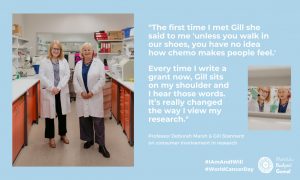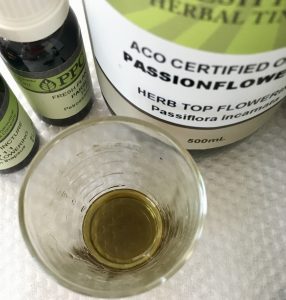Life after cancer: subject to collaborator update
October marks my 7 year ‘cancerversary’. I am relieved to remain disease-free, against the odds for ovarian cancer (OC), which has a dire 46% 5 year survival rate.
Being not only alive but well, I feel compelled to speak up for those who aren’t able to. My involvement as an advocate and consumer in research continues to blossom. This year I’ve taken on a few additional commitments, since my last ‘subject to collaborator’ update.
As well as my roles with Consumer Advisory Panel and Cancer Voices for TCRN, working directly with researchers to represent the experience of women with OC and their families, I have two new consumer collaborations.
University of Newcastle
In January I was approached by Professor Nikola Bowden, an awesome molecular biologist and OC advocate at the University of Newcastle/Hunter Medical Research Institute (HMRI), when she was applying for a government Medical Research Future Fund (MRFF) grant. This one-off funding round was specifically for new research into ovarian cancer and, as always, there was fierce competition.
As consumer roles are usually minor, I was surprised when Nikola suggested that I’d be a ‘chief investigator’ (CI) on the project if the grant was successful. CI’s are responsible for the design, conduct and reporting of a study and it’s rare for a non-academic , let alone a consumer, to be included.
As well as being an incredible honour, it came with funding to work a couple of days per month.
Long story short, like my OC survival, the application bet the odds and the 5 year drug repurposing grant was successful! It’s eye opening being involved with this project and I’m very excited about the study’s practical and potentially speedy design to find new treatment options.
How to support ovarian cancer researchers directly
Research funding is complex, competitive and very difficult to secure, especially for less ‘popular’ cancer’s like ovarian. One way to help researchers is to donate directly (philanthropic donations, unlike government grants go 100% to the team, rather than the university or institution taking a hefty chunk).
You can support the legacy of Jill Emberson through Prof Bowden’s work by donating to HMRI. Please remember to add “Nikola Bowden – ovarian cancer research” to the comments when you donate to ensure it goes to the team.
Another amazing researcher who I work with, A/Prof Caroline Ford, heads the Gynaecological Cancer Research Group at University of New South Wales. They are creating a screening test for ovarian cancer but need funding. You can support Caroline and team by donating here.

ANZGOG
I strongly believe my survival is largely due to my GPs immediate action. At the moment, early diagnosis is our best chance to survive this cancer. I wrote about being a presenter with Survivors Teaching Students (STS) in my previous update. By sharing our stories with medical and allied health students, it raises awareness of ovarian cancer so other women can also benefit from early diagnosis. In March I facilitated the inaugural STS presentation online to naturopaths and there’s a new project in the wings that I’m looking forward to exploring in the New Year.
Recently I was appointed to the Consumer Research Panel of STS’s parent organisation, the Australia New Zealand Gynaecology Oncology Group (ANZGOG). It is the peak organisation conducting gynaecological cancer clinical trials in Australia and New Zealand. The consumer panel provides feedback on research proposals, concepts and trials. At a recent meeting I was humbled to witness the dedication of our leading OC researchers and clinicians. As a patient it can feel like there are very few treatment options for this disease but hearing about research that is in the pipeline gives me reason for hope.
I also continue my consumer in research and advocacy work with various other organisations and researchers.

How does being a naturopath sit with consumer roles?
I’ve always advocated for my clients to seek appropriate treatment. Often naturopathic lifestyle and remedies alone are enough. But there are times when collaboration beyond natural medicine is essential. This is especially true with cancer.
There is no evidence-based naturopathic ‘cure’ for cancer. As a practitioner, it is a privilege to support clients recovering from conventional treatment and help improve their wellbeing.
Currently conventional treatments for OC are limited and often come with life-challenging side effects. To find better treatment options, extend remission, reduce toxicity from chemotherapy and to ultimately offer a similar survival rate as breast cancer (over 90%) largely falls in the realm of conventional medicine. To be part of that process, to share the experience of an ‘end user’ and advocate on behalf of other women with this disease, is something I’m proud to do.
Naturopathy is my central philosophy and belief. I love helping people feel healthier through food, lifestyle and herbs. Taking care of my naturopathic and mentoring clients remains my priority. I believe learning more about medical oncology, provides greater insight into understanding cancer and ultimately empowering my clients.
My (virtual) clinic continues as usual. I work with people seeking naturopathic support for most health conditions, not just cancer.

Similar Posts:
Social Share
4 Comments
Leave a Reply
You must be logged in to post a comment.






Pingback: Gill Stannard » From subject to collaborator: being a consumer in cancer research
Pingback: Gill Stannard » Finding joy: February update
Pingback: Gill Stannard » Pop the party streamers – it’s time to celebrate 30 years in practice!
Pingback: Gill Stannard » Clinic update: winter 2023